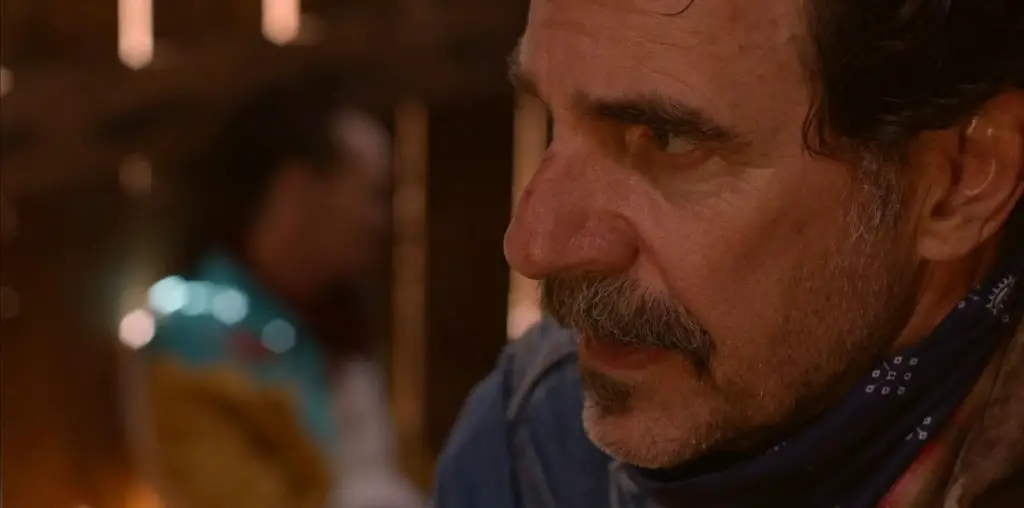
Deep down we’re all really sick people. We like to watch. But what happens when we take that basic human interest to the next level, by actually stalking somebody? That’s kind of the trap that faces our poor “hero” in “Following.” Bill is a loser really, an everyman, but that’s okay because we remember that over half of Hitchcock’s films were populated by Bill’s. Bill’s problem is that even when he hasn’t done something wrong it seems like he has. Bill (Jeremy Theobald) is an unemployed “writer” with long hair and beady eyes. He likes to follow people on the streets of London at random, then write about them. Bill hasn’t gotten much writing done. Bill has a rule, a bottom line. Never follow someone more than once. To do that implies some kind of personal sickness that Bill doesn’t want anything to do with. It goes without saying that in “Following,” Bill is forced to break his own rule and it will, like it did in Hitchcock’s films, lead to his doom.
Bill gets “made” so to speak by a charming, suave house thief named Cobb(Alex Haw). He spotted Bill following him ages go, and now he’s been following him, for reasons that become increasingly and diabolically clear. Together, the two men, the Cary Grant clone and the shaggy bum, rob houses, but spend more time doing psychological profiles on the people they violate than actual stealing. The trap is set.
“Following” echoes Memento in the way the story unfolds. No surprise, it’s told out of order, in three different story dimensions which, as Christopher Nolan has explained in interviews, is the way we receive information in everyday life. As the film opens, Bill is being interrogated by a cop, and his long hair is gone. What happened? How did he get from here to there? That’s the point.
“Following” is a superior thriller boosted by its brief running time which allows viewers to really narrow their eyes on the tight action and hard to follow story twists. Here’s a hint. Instead of watching for tattoos in “Following,” think pearls, and money, and black eyes, and women’s panties. You get the idea. The performances are all serviceable and the spare locales add a real “Third Man” type of underground feel to the film. The black and white look and the spare population in the film really pull you in, almost, like a peeping tom.
Now, I’m not sure the details towards the end add up. Everything seems too neat and tidy and the villain’s calculations are a little too reliant on fate and circumstances and lucky guesses for my taste. But in its own world, “Following” plays fair. Unlike Memento, everything is real.
Bill’s ultimate dilemma is a true existential nightmare. When people commit a crime like murder they’re trapped because logically, there’s no story a criminal can come up with to explain everything, since they did in fact commit the crime. Evidence proves lies and disproves alibis. But in “Following,” and this is the best idea in the film, that’s not the case. For poor Bill, the truth isn’t his ally, it’s his enemy; it proves him guilty even when he’s not. Then again, he shouldn’t have been “Following” people in the first place. I guess, in the end, everyone gets what they deserve, except for one character who vanishes into the sidewalk.
SPECIAL FEATURES ^ This is an excellent DVD, beginning with Nolan’s running commentary, which, if you choose, can be run simultaneously with the film, or the actual shooting script(complete with pen scratches and cat piss), or subtitled dialogue at the bottom of the screen.
In his commentary, Nolan almost offers a blueprint for the independent film-maker, in particular his description of the difficult search for locations and cast. The locations (a rooftop, Nolan’s parent’s house, friend’s houses, a bar, spare apartments) are described in detail in terms of their use and the ingenuity Nolan and crew used in finding good angles, like the bar, which has the coolest door you’ll ever see. By the way, Nolan’s uncle plays the cop who interrogates Bill throughout the film.
The bio section is fascinating, especially if you’re the type of fan who wonders why actors from important independent films are never heard from again while the directors shoot to the moon. Alex Haw, who plays Cobb, is an architect in New York and Jeremy Theobald, we discover, is still searching for that next starring role. Maybe he could team up with the actor’s from “Clerks”? How come no one in Hollywood ever hires these guys?
But the final cherry on the “Following” DVD comes with the “chronological order” option which allows you to watch the movie from beginning to end, although, by definition, some of the back and forth stuff still remains. I guess there’s lots of “intelligent” viewers out there who find this option kind of condescending, but trust me, as someone whose spent many hours digging through the mysteries of Memento and films of its kind like “Following,” many will find this a welcome relief, if not a savior. Moviegoers should never be ashamed to admit when they’re in over their heads.
